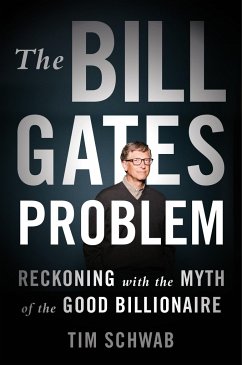New York Times Editors' Choice
A powerful investigation of Bill Gates and the Gates Foundation, showing how he uses philanthropy to exercise enormous political power without accountability
Through his vaunted philanthropy, Bill Gates transformed himself from a tech villain into one of the most admired people on the planet. Even as divorce proceedings and allegations of misconduct have recently tarnished his public image, the beneficence of the Gates Foundation, celebrated for spending billions to save lives around the globe, is taken as a given. But as Tim Schwab shows in this fearless investigation, Gates is still exactly who he was at Microsoft: a bully and monopolist, convinced of his own righteousness and intent on imposing his ideas, his solutions, and his leadership on everyone else. At the core, he is not a selfless philanthropist but a power broker, a clever engineer who has innovated a way to turn extreme wealth into immense political influence-and who has made us believe we should applaud his acquisition of power, not challenge it.
Piercing the blinding halo that has for too long shielded the world's most powerful (and most secretive) charitable organization from public scrutiny, The Bill Gates Problem shows how Gates's billions have purchased a stunning level of control over public policy, private markets, scientific research, and the news media. Whether he is pushing new educational standards in America, health reforms in India, global vaccine policy during the pandemic, or Western industrialized agriculture throughout Africa, Gates's heady social experimentation has shown itself to be not only undemocratic, but also ineffective. In many places, Bill Gates is hurting the very people he intends to help.
No less than dark-money campaign contributions or big-business political lobbying, Bill Gates's philanthropic empire needs to be seen as a problem of money in politics. It is a dangerous model of unconstrained power that threatens democracy and demands our attention.
A powerful investigation of Bill Gates and the Gates Foundation, showing how he uses philanthropy to exercise enormous political power without accountability
Through his vaunted philanthropy, Bill Gates transformed himself from a tech villain into one of the most admired people on the planet. Even as divorce proceedings and allegations of misconduct have recently tarnished his public image, the beneficence of the Gates Foundation, celebrated for spending billions to save lives around the globe, is taken as a given. But as Tim Schwab shows in this fearless investigation, Gates is still exactly who he was at Microsoft: a bully and monopolist, convinced of his own righteousness and intent on imposing his ideas, his solutions, and his leadership on everyone else. At the core, he is not a selfless philanthropist but a power broker, a clever engineer who has innovated a way to turn extreme wealth into immense political influence-and who has made us believe we should applaud his acquisition of power, not challenge it.
Piercing the blinding halo that has for too long shielded the world's most powerful (and most secretive) charitable organization from public scrutiny, The Bill Gates Problem shows how Gates's billions have purchased a stunning level of control over public policy, private markets, scientific research, and the news media. Whether he is pushing new educational standards in America, health reforms in India, global vaccine policy during the pandemic, or Western industrialized agriculture throughout Africa, Gates's heady social experimentation has shown itself to be not only undemocratic, but also ineffective. In many places, Bill Gates is hurting the very people he intends to help.
No less than dark-money campaign contributions or big-business political lobbying, Bill Gates's philanthropic empire needs to be seen as a problem of money in politics. It is a dangerous model of unconstrained power that threatens democracy and demands our attention.
New York Times Editors' Choice
"Schwab makes a strong case, based on years of reporting, that under the direction of a humbler man the Gates Foundation would probably be a more effective force for good."
-The New York Times
"Schwab's excellent exposé of hyper-billionaire 'myths' could yet help to catalyse political murmurations towards...more collective ends."
-Nature
"[A] muckraking work of investigative journalism with a fierce polemical edge...Nobody who comes away from reading The Bill Gates Problem will look at him in the same way."
-The Times
"In Stage One of the neoliberal revolution, we cut taxes, encouraged tech monopolies, deregulated everything, and built up a set of billionaires like the world had never seen before. Stage Two will come when we learn to love all these changes-because those billionaires are fine people doing good in our sadly privatized world. Thanks to Tim Schwab's devastating account of the Gates Foundation, however, that day of rationalization may never arrive. Read it and learn the brutal truth: there is nothing altruistic about the world's favorite billionaire."
-Thomas Frank, author of What's the Matter with Kansas
"Schwab's deep reporting offers a convincing and informative alternative to the established image of the Gates Foundation."
-Booklist (starred review)
"An eye-opening look at the use of tax-subsidized money by private philanthropy."
-Kirkus
"Tim Schwab has written the definitive critique of Bill Gates as bully-philanthropist. Schwab uses the case of Gates to tell a compelling and carefully researched story that raises disturbing questions about the lack of accountability of power-philanthropy."
-Robert Kuttner, co-founder and co-editor, The American Prospect
"An extraordinary and detailed work of investigative journalism into an underexplored nexus of influence in global affairs."
-The Telegraph
"This is not the story of one bad man, so much as a demonstration of the inability for anyone-no matter how smart or rich-to solve the world's problems from the top down with money and technology. As this well-argued and immensely engaging account of Bill Gates's forays into world-saving by fiat make clear, the problem with Big Philanthropy is the Big Hubris that comes along with it."
-Douglas Rushkoff, author of Survival of the Richest
"Although Schwab's book is a tale of frustration and even rage at the culture of secrecy and often incompetence inside Gates's philanthropic world, it is also strangely heartening. Perhaps we are starting to solve the "Bill Gates Problem" by the creeping (if highly uneven) return of faith in the ability of public authorities to do better than private world-makers, alongside the ongoing discrediting of the tech saviours who enjoyed such a gullible audience in the early years of the millennium."
-The New Statesman
"In this incisive and penetrating book, Schwab dares to confront a question society has long ignored: should a secretive, unaccountable billionaire dictate policy in public health, education, and science? Fearlessly rendered and much-needed."
-Sonia Shah, author of The Next Great Migration
"Tim Schwab follows the money to expose what happens when one man-however intelligent or well-intentioned-amasses so much wealth and so much power, he can literally dictate to governments around the world. With great skill-and given the range of Bill Gates's influence, considerable courage-Schwab pulls back the curtain to deliver a classic of muckraking journalism."
-D. D. Guttenplan, editor, The Nation
"Bill and Melinda Gates were always hailed as a perfect couple before the reality turned out to be different. Is their reputation as the world's perfect philanthropists about to be similarly destroyed?"
-The Daily Mail
Schwab's critique hits home when he details how Gates Foundation initiatives have misfired with little benefit from billions spent.
-Publisher's Weekly
"Schwab makes a strong case, based on years of reporting, that under the direction of a humbler man the Gates Foundation would probably be a more effective force for good."
-The New York Times
"Schwab's excellent exposé of hyper-billionaire 'myths' could yet help to catalyse political murmurations towards...more collective ends."
-Nature
"[A] muckraking work of investigative journalism with a fierce polemical edge...Nobody who comes away from reading The Bill Gates Problem will look at him in the same way."
-The Times
"In Stage One of the neoliberal revolution, we cut taxes, encouraged tech monopolies, deregulated everything, and built up a set of billionaires like the world had never seen before. Stage Two will come when we learn to love all these changes-because those billionaires are fine people doing good in our sadly privatized world. Thanks to Tim Schwab's devastating account of the Gates Foundation, however, that day of rationalization may never arrive. Read it and learn the brutal truth: there is nothing altruistic about the world's favorite billionaire."
-Thomas Frank, author of What's the Matter with Kansas
"Schwab's deep reporting offers a convincing and informative alternative to the established image of the Gates Foundation."
-Booklist (starred review)
"An eye-opening look at the use of tax-subsidized money by private philanthropy."
-Kirkus
"Tim Schwab has written the definitive critique of Bill Gates as bully-philanthropist. Schwab uses the case of Gates to tell a compelling and carefully researched story that raises disturbing questions about the lack of accountability of power-philanthropy."
-Robert Kuttner, co-founder and co-editor, The American Prospect
"An extraordinary and detailed work of investigative journalism into an underexplored nexus of influence in global affairs."
-The Telegraph
"This is not the story of one bad man, so much as a demonstration of the inability for anyone-no matter how smart or rich-to solve the world's problems from the top down with money and technology. As this well-argued and immensely engaging account of Bill Gates's forays into world-saving by fiat make clear, the problem with Big Philanthropy is the Big Hubris that comes along with it."
-Douglas Rushkoff, author of Survival of the Richest
"Although Schwab's book is a tale of frustration and even rage at the culture of secrecy and often incompetence inside Gates's philanthropic world, it is also strangely heartening. Perhaps we are starting to solve the "Bill Gates Problem" by the creeping (if highly uneven) return of faith in the ability of public authorities to do better than private world-makers, alongside the ongoing discrediting of the tech saviours who enjoyed such a gullible audience in the early years of the millennium."
-The New Statesman
"In this incisive and penetrating book, Schwab dares to confront a question society has long ignored: should a secretive, unaccountable billionaire dictate policy in public health, education, and science? Fearlessly rendered and much-needed."
-Sonia Shah, author of The Next Great Migration
"Tim Schwab follows the money to expose what happens when one man-however intelligent or well-intentioned-amasses so much wealth and so much power, he can literally dictate to governments around the world. With great skill-and given the range of Bill Gates's influence, considerable courage-Schwab pulls back the curtain to deliver a classic of muckraking journalism."
-D. D. Guttenplan, editor, The Nation
"Bill and Melinda Gates were always hailed as a perfect couple before the reality turned out to be different. Is their reputation as the world's perfect philanthropists about to be similarly destroyed?"
-The Daily Mail
Schwab's critique hits home when he details how Gates Foundation initiatives have misfired with little benefit from billions spent.
-Publisher's Weekly








